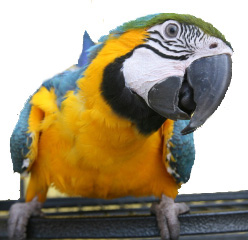 Choosing a healthy bird is the first step. Next comes what you feed your new pet.
Choosing a healthy bird is the first step. Next comes what you feed your new pet.
Raising a healthy bird relies on making sure he or she gets the appropriate food and water needed. This helps in the longevity of the bird as well as happiness.
1. If you want your bird to live a long life it is important to feed it in a nutritionally sound way. Un healthy birds often die too young because they are malnourished or they pick up a disease because they were not being fed correctly.
2. Birds who are part of the parrot family should be fed a variety of foods. Seeds are used by most as the only part of the bird’s diet and this is a mistake. Seeds have too much fat, not enough protein and almost no vitamins. Seeds should not make up more than 50 percent of your bird’s diet.
3. Try healthy table foods like items that contain whole grains and pretzels, pasta and whole wheat bread. Many birds can be persuaded, given time and encouragement, to eat dairy and poultry products. Try serving your bird low-fat cheese, yogurt and chicken. Avoid any food that is high in fat and stay away from avocados, they are toxic to
birds!
4. Beans and legumes as well as fruits and vegetables are good sources of nutrition for the pet bird. It may take quite awhile to get your fine-feathered friend to except these changes, (up to a year) but it will be the best thing for your healthy bird.
5. When you get ready to make these changes do it slowly. Offer the fresh foods twice a day for about an hour at each feeding. Don’t leave the fresh food in the cage longer than that. It becomes unappealing and can develop bacteria.
6. Feeding your bird twice a day is a good idea. Your bird will become hungry between feedings and this practice produces a more active bird. With a healthy appetite the bird is more likely to try new foods. You will also be able to keep a closer watch on how much your bird is eating. (If your bird is sick,laying eggs, caring for young, or nesting they should always have food available.) When food consumption drops, a bird is usually not feeling well.
7. If your bird is having a hard time getting used to the new diet, try warming the food or cooking the vegetables. It will take a little time to discover what works for your bird. Offer seeds only at meal time and along with other foods until you see that your bird is eating enough to stay healthy. Birds often do better with new diets when they are fed outside the cage.
8. Water is the final key to your healthy bird ’s nutritional success. The water must be fresh and all bowls should be thoroughly cleaned each day with hot water and soap. Disinfect these bowls with bleach every week. Be sure all the bleach is totally rinsed away from the bowls.
Adding a multivitamin to the bird’s water daily is a good idea until you know the bird is getting enough vitamins from the fruit and vegetables. A healthy bird is a delightful pet and proper feeding allows them to enjoy a quality life and this practice can extend their life expectancy.
